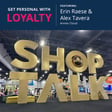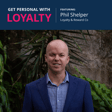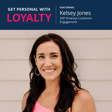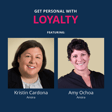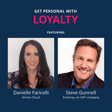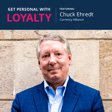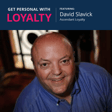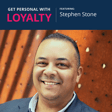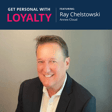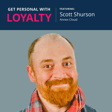Become a Creator today!Start creating today - Share your story with the world!
Start for free
00:00:00
00:00:01

The Impact of Personalization in the Digital Age (ft. Michael Sitarzewski)
In this episode, we meet with Michael Sitarzewski, VP of Innovation & Technology at Tandem Theory, to discuss the ways brands can bring personalized experiences to their consumers. We discover the power of direct mail, and the importance of having loyalty data when advertising to your target audience. Tune in to learn more about personalization and staying ahead in loyalty! Also, visit www.tandemtheory.com for more information about Tandem Theory.
Transcript
Introduction to Personalization in Loyalty
00:00:12
Speaker
Get Personal with Loyalty, where we're discussing using loyalty to deliver personalized, relevant customer experiences. Hello, everybody. Welcome to the next episode of Get Personal with
Meet Michael Sudarzewski, VP of Innovation
00:00:23
Speaker
Loyalty. Today, I'm here with Michael Sudarzewski. He is the VP Innovation and Technology at Tandem Theory. Welcome, Michael.
00:00:32
Speaker
Welcome. Thank you. Thank you. Happy to be here. Yeah, we're excited to have you here today. I always like to hear what's new out there. To get started, why don't we start
Michael's Career Journey
00:00:41
Speaker
with your background? How did you end up in this loyalty space? I know you guys are much more of a broad loyalty space than we are here at Annex Cloud. We're more programmatic, but still, it's all about the customer, right?
00:00:52
Speaker
Absolutely is. And the reason that how I landed at Tandem Theory with that title of innovation is I started building technology companies in the early 90s, maybe 94, 95. If anybody remembers that time, there were probably 35 million people total on the internet and it just started to become commercial. So it was kind of a cloud or a vacuum of opportunity back then.
00:01:13
Speaker
But the first thing that we built was we built an apartment search product. Then we got into coupons and classifieds, things like that. And then as the 90s moved on, I built a dating site with a friend of mine. We sold that in 1999. Learned a lot about monetization during that process and kind of figuring how to engage with people that are paying for things because the other things were free, right?
00:01:33
Speaker
In 2001, we built a DIY website builder. You think of Wix and Squarespace and things like that. We built a similar technology that we ended up selling in 2007. And so learned a lot more about the consumer and what their needs are. And then had to build in these technologies that we're talking about today with loyalty and merchandising and those things.
00:01:53
Speaker
When I say we built it, I actually wrote the code. So there's the high-level understanding of what loyalty is, and then there's the deep and the leads, the writing, the SQL commands, and all those things. So that's also me. In the mid-2000s, I built a company called Callisto, which we later named Epic Playground. Callisto was a real-time audio and video analytics application. It was JavaScript, a line of JavaScript. You throw it on your website, the technology would look for any audio or video on the site and show the producer where people were dropping off and all those ones.
00:02:22
Speaker
Everybody knows about that today, but in 2012, 2011, we were building it, so it was pretty fresh. And then that company, the last thing that I did, pivoted that company into the direct mail space. And what I did was I combined the location with web traffic, and we were one of the first to combine the two to be able to take that geolocation, check and see if the address was a single family home.
00:02:44
Speaker
If it was, then our brands could drop a direct mail piece based on the user's journey and drop a direct mail piece into the home of the mailbox. And so that was the last technology play that I did after that, after I shut that down, I ended up joining tandem theory. And here I am. Wow. I know we've got a whole agenda for what we want to cover today, but now I'm like, wait, there's so many interesting things you've done.
00:03:04
Speaker
I want to talk about. But what I think is fascinating is I've had a lot of people on podcast and many of us working in the 90s like you were. And most of the people start there talking about direct mail and how now they're digital.
00:03:20
Speaker
You've always been digital and now you use digital to go back to direct mail, which I think is really interesting. I think now because we don't get as much direct mail anymore, I think the impact there is so much stronger. Is that part of what you were seeing and why you guys did that?
Effective Use of Direct Mail
00:03:36
Speaker
Yeah. I primarily did that because the studies of the time are if you're familiar with the brand, if you know the brand and you get a piece of direct mail from a brand that you want,
00:03:46
Speaker
You're much more likely to engage with it and by engaging and just being simply as you're sorting through it pause on and look at it for a second right before you throw it all in the band and that was really. Direction that I wanted to take that company in that particular product was let's take brands that have maybe they're not doing direct mail at all they don't have that touch but we know.
00:04:03
Speaker
based on the product that they were on the website they already they've already engaged with the brand in some way so when that direct now piece arrives and in their mailbox they're gonna engage with it they're gonna see it and we were able to prove that out pretty well the challenge that we had with that company is it was small and we had some pretty large competitors that entered the market that were well funded directly after us i miss the patent by i think it was about a week
00:04:25
Speaker
on that technology and it just drove me bananas. But that was what it was. It was how can we how can we bring brands that maybe aren't even in direct mail into that space and do it efficiently. You know we we would send one piece per thousand that our competitors would in the direct now space programmatically right or not programmatically but the traditional means and we were as effective. And so that was it was a beautiful technology. Just real quick. I started my career in the print world.
00:04:50
Speaker
So that was in the late 80s. I was in the print and design world, the graphic design world. So I did Ruby lists and plates and all those things before the digital technologies came around. So full circle. Yeah, I remember doing creating brochures on the plates.
00:05:07
Speaker
Exactly. Kind of forgotten about that. I know I do love the opportunity that I think direct mail has today which in a sense because it makes the impact that you're talking about and it has the ability to do that because obviously people aren't doing as much of it because it's more expensive.
Challenges in Personalization and Privacy
00:05:26
Speaker
But also part of the topics that we want to talk about today around personalization is
00:05:31
Speaker
We're still not seeing personalized experiences in the digital space as much as we could, given where we are with technology that's at our fingertips today. I mean, inboxes are overflowing, so nothing is really making an impact, yet something comes into my mailbox today.
00:05:48
Speaker
I mean, I get my Nordstrom notes and I'm jazzed about it and I get offers from American Express that are just beautifully done and I have to go see what their special offer do I have in there. Yeah, I think our challenge now is when we were building in the 90s, we were able to do pretty much whatever we wanted to do with the technology on the back end from a tracking standpoint, right?
00:06:11
Speaker
And there were some companies that really took that to the edge, like a Spokeo. Spokeo does some really odd things. I'm sure they've cleaned it up today, but there's a lot of data in that platform. But now we've got regulators. Now we've got governments that are kind of putting caps on what we're able to do and having permissions and data longevity and how long can we keep that stuff around. And so even our transactional history as consumers goes away by law. And so we have to be mindful of that too. But the one thing we kind of talked about before the show started was
00:06:38
Speaker
The advertising world when you're doing an add a loyalty add to a group of people that you know are engaged in your product you know that when you place an added digital add anywhere it's really difficult for the consumer to let the brand know that they're not they don't need to see that add anymore.
00:06:55
Speaker
There's no way for the consumer to give feedback to the advertiser that they are no longer a part of that thing. So that's just one of the stressors as somebody who's placing media in the market is making sure that you're not inundating your loyal customers with stuff they don't need. I think that's another problem. So we really didn't talk about your role yet.
00:07:14
Speaker
But in your role, is that something that you're guiding clients on? We know as consumers, we all get those ads and sometimes it can be a little frustrating. And to your point, though, it would also be nice to be able to say, hey, I already made that purchase. You don't need to meet me up. You're wasting your money right now. Go use it on somebody else. Do you have some solutions or ideas on how to help brands through that situation?
00:07:35
Speaker
Yeah, I think so. I mean, one of the largest growth areas in the past year and a half, two years is first party data, right? We've been thinking in terms of marketing and everything about third party data up until the past few years. First party data is really where that rubber starts to hit the road because you know when somebody buys that product, they buy it through your website or they buy it through some sort of a campaign where you've got your campaign code and that comes back and you can say this person actually purchased this item.
00:08:03
Speaker
the next time you go to pull that list of consumers to target with an advertisement, it shouldn't be included in that list anymore. So to your point, we have the technology to exclude people from certain offers, direct mail we were talking about. You should know that this address now owns this appliance. Don't send them this direct mail piece, right? And so I think that's a simple thing to do. We haven't talked a lot about tandem theory at this point, but it is a data-focused, data-first agency, and those are the kinds of things that we do coach clients through.
00:08:30
Speaker
Thank you for that. And since you kind of teed that up, why don't you share a little bit more about tandem theory and specifically your role there would be great to let
Tandem Theory's Culture and Focus
00:08:38
Speaker
everyone know about. Yeah, tandem theory experience. This is one of my favorite things about this company is we experienced a tremendous amount of growth through COVID and through the work at home.
00:08:46
Speaker
era. As soon as COVID hit, the decision was made by leadership to everyone's working from home now. Now we're using our office as a co-working space. If you want to come in, you have a client meeting, something like that, we can really spend a lot of time there in those regards. But that culture has even persisted today. And so there's no push to go back to the office.
00:09:07
Speaker
We have three Ts. I don't know if that's been mentioned before. The three Ts are teamwork, transparency, and trust. And those are not only for theorists, as we call our fellow employees, those are also for our customers and for our clients. And so if we don't have that sense of trust with our clients, or they don't trust us if we give them errant information or false information or whatever, then they don't come back. They don't hang around with us. The other thing that I love about this agency is
00:09:32
Speaker
Almost all of our customers are referrals from existing customers and so that's just a remarkable thing and that tells you a bunch about quality of work that we do and and the level of effort we put into each each client. That's wonderful. And you guys coach clients and to kind of talk about from my perspective versus yours where we are
00:09:53
Speaker
Loyalty programmatic loyalty cuz we are loyalty tech and we don't offer additional services so we're very focused on that but you guys are out there coaching clients across is it safe to say like their entire customer experience. In some cases the entire customer experience sure we have a we definitely have a.
00:10:13
Speaker
a focus in CRM and analytics. Those are definitely two parts of the agency that are strong. We also have a deep creative team. The founders of this agency had another agency that they founded that I think their employee count got up to about 800. Right now, we're a little over 100 in our agency. So we're starting to see these nice teams form. So when we have an ask, we had a client come in last week on Friday with a big ask to push something out on Monday.
00:10:41
Speaker
Nothing we've ever done before and our creative team using AI and using generative AI tools is able to just put this thing together. Client understands that it's all generative AI and that we're utilizing those tools, but we're able to turn this thing around in no time and so.
00:10:58
Speaker
We're talking about what the specialties are, but we also have these little one-off things that we really enjoy doing. Those are the things that keep us on the innovative side back to innovation. Awesome. I love that story. I don't think we were going to plan to get into the depths of AI today, but I think we're all using it and seeing how we can just get everywhere we want to get to quite a bit faster. A little bit quicker. That's right. Yeah.
00:11:20
Speaker
So we go back and think about this the concept of personalization and you talked about many brands reliance on third party data and i think we do a lot of work in retail and i think they had a focus on that but i think it seems like fmcg and manufacturing and that.
00:11:40
Speaker
area was almost relying on it much more than a lot of other verticals. And I suspect they've been probably scrambling to make a lot of changes to try to understand who their actual end user customer is.
00:11:54
Speaker
I guess what's going on and how are you seeing these or how are you coaching these companies on responding? And I suspect it's something that they can't just turn on and die. There has to be some pretty big planning and understanding of, okay, how are we changing our
Shift to First-Party Data
00:12:11
Speaker
approach? How are we changing our strategy?
00:12:13
Speaker
what is this going to do and what else do they need to know because I suspect there's also a bit of a domino effect that's going to be happening. There's one thing that happened around privacy but we all know that the government's going to be intervening more on behalf of the consumer too over time.
00:12:29
Speaker
Yeah, absolutely. And the thing about the government being involved is, unlike the EU, which has one specific set of laws that covers the entire European Union, the United States doesn't have any federal legislation today, right? And so it's up to the states to choose how they want to enforce these things. And that makes it extremely cumbersome for data providers. It makes it extremely cumbersome for everyone operating in this space. And so going back to third-party data and how do you coach clients away from that,
00:12:57
Speaker
It starts with an understanding of what was what used to be is doing lookalikes and finding other people that kind of look or feel like your existing customer base. You're familiar with this. Everybody listening is what we want to do now is we want to find the people that are actually using the products or engage in the products that we're selling or services and engage them in ways that we haven't before. So that could be things like micro surveys. I'm sure you're familiar with that idea instead of sending a survey monkey with 30 questions on it, you send a survey with maybe two questions.
00:13:26
Speaker
send another one in two weeks and you end up with the same thirty answers but it's not as much of a burden on the consumer and that gives you a lot of data a lot of things you can target a lot of mechanisms you can trigger to people and the other thing is is asking those existing customers.
00:13:42
Speaker
you know, for referrals. And so there are referral programs and affiliate programs and all these different things that you can do to engage friends of friends. So you're not you're not actually searching for what the likes you're actually you're having your customers bring them to you, which is really nice. And then of course, you know, you have all the data usage policies and those kinds of things laid out. So every
00:14:02
Speaker
thing is buttoned up. But I think those are probably really very simple things that you can do. Leveraging email and segmenting and doing all those things or other buckets that I think a lot of clients don't understand. We have a multi-billion dollar customer
00:14:17
Speaker
Who who has a nice giant email list, but up until about 6 months ago they weren't segmenting and so every time they would send an email they would send it to the entire list. Like that's just not an efficient way to use to use data and so what you do is you kind of figure out what the clicks are you create the buckets in the segments and those things and you refine that message.
00:14:37
Speaker
which increases obviously the click-through rates and engagement and so on. So leveraging the existing things that you have in it with a different kind of an angle or a different pitch can really help. I agree. We're seeing a lot of it. In our technology, we built what we call progressive profiling and it's essentially the Michael surveys that you're talking about and it can be delivered in really fun interactive ways. So some of our clients are using it
00:15:02
Speaker
somebody logs in and they get these images and you like this, do you like this? And so it's thumbs up, thumbs down kind of things, which is, which I think also makes it the interaction with the brand do stronger. And we've certainly seen that the more that somebody interacts with your brand, in addition to transacting, those people will be spending more and will be stronger advocates too. So it all ties together.
00:15:25
Speaker
Interestingly, that technique that you're describing is also how we train large language models. Wow, there you go. Is this a car? Yes, it's a car. But no, that's great. Segmented engagements like that, because the attention span of today's consumers, it's super small. When you segment that by age, the younger the more, let's keep moving here, things that you want to put in front of them versus
00:15:54
Speaker
no extras like us might have a little more. Patients with a longer engagement is switching gears a little bit as as we were talking in a safari search and some different things that are going on with apple. And then maybe brands don't understand but probably worth sharing with those of us and then like what's changing how is it changing.
00:16:15
Speaker
Is there anything we can do about it or does that just drive us back to the first party data story again too? Yeah.
Impact of Apple's Privacy Features
00:16:23
Speaker
One of the interesting things that has happened is that Apple as a company has really taken it upon themselves to try to shape what privacy looks like from a consumer standpoint and from their devices and operating systems. With the release of iOS 17 just a couple of days ago, one of the features that was introduced was this
00:16:46
Speaker
It's basically when you're in Safari, you have private browsing mode. I think all browsers have this now, right? New private window, you open this thing up, you don't want to be tracked. Well, what happens is sometimes you are tracked, right? So if you have a private browsing window open and you're in Chrome, for example, and you click a link in email, or you copy a link in email and you paste it in your private browsing window, that click ID actually still goes to the brand, whatever you clicked on. So if you copied and pasted a Facebook click ID,
00:17:14
Speaker
clicks to those Facebook and it lets you know who that user was. With Apple, if you're in private browsing mode and you click that link, it removes the Facebook click ID. So Facebook no longer knows the user, all the UTM parameters are still there so you can track the campaigns efficiently, but you don't know which user clicked that link. That's the same across Google and all the other things that are common. I think over time, what we're going to see is the more nuanced smaller IDs that we're not familiar with, like Dallas Morning News, for example,
00:17:41
Speaker
has a link tracking ID that's not removed. Because Apple doesn't know about it yet. At some point in time, they're going to know about this click ID from Dallas Morning News. It's very specific and they'll remove that too. I think that will grow. But I think the more important part here is that we've got to divide ourselves when we're in this space between we the user and we the vendor.
00:18:08
Speaker
What we want as a vendor is we want all the data and we want it now and as a consumer.
00:18:14
Speaker
We don't want you necessarily to have the data and we don't necessarily want you to have it ever. And so there's this weird line that we have to face as in this space. And what Apple is doing is they're putting the consumer first. And part of the story told in the media is that, sure, Apple does this, but Apple also has their own nefarious reasons for doing that, which they have their own ad network and they have their own things.
00:18:39
Speaker
inside of their their company the thing that most people are missing is maybe that's the case but apple also anonymize this data when they use it right so they've got a whole privacy policy to read it can i figure out what it is what they're trying to do those really protect the consumer i think i believe that.
00:18:56
Speaker
based on what I've seen in the market. So email tracking, the hide my IP address, all those things built into the platform. It's pretty wonderful as a consumer. But as vendors, we just need to be able to account for those. So your open rate and email, for example, Apple has completely changed the way that works now. Your emails are automatically marked as red in the middle of the night when you're connected to Wi-Fi and Power. It's not when you actually opened it. Those are no longer relevant. So we're just having to change the way we operate.
00:19:25
Speaker
That's interesting. As you were talking to, and this is my ignorance, as consumers, I think we do want our privacy. But I also think that especially different generations, as I hear, are willing to give their data to certain companies, the ones that they trust, and the ones that they feel are truly being good stewards of their data.
00:19:49
Speaker
Is the pendulum swung too far in one direction, so now it's an all or nothing, or is there still some flexibility that myself as a consumer, I can do this, or is it just that fact that my search stuff is always going to have to be private, but then I'll have to go above and beyond and actively give my data if I want them to have it?
00:20:14
Speaker
Just looking here real quick to see if I can find this. There's actually a segment in your system settings. I don't know if you're an Apple user, an iPhone user or not. But if you go to settings and then you go to privacy and security, there is an option that is tracking. And there's a slider box there that says allow apps to request to track.
00:20:32
Speaker
Basically, what that means is instead of a blanket saying no, you can't track this user, you can allow each application to request the ability to place advertising IDs on your device to be able to track it. The thing is, by default, that switch is off.
00:20:47
Speaker
If you do want to allow Facebook or Google or any one of those, you can actually allow them in your system settings. Yeah, absolutely. But I think Apple's default is protect. If you know as a consumer that you want to engage, you always have the ability to turn that back on. As far as what we were talking about before with the click IDs and Facebook and all those things, it's really important to understand that it only applies to private browsing mode. It's not your regular Safari window.
00:21:17
Speaker
although Safari and other browsers have started to block advertising and certain tracking cookies and things like that, I think that really points to the cookie list future. Right now, people are trying to track lots of things you do through third-party cookies, and that is all about to change pretty significantly. It's been something that's been on the horizon for a while, but there hasn't been a solid push to make that happen. I think Google's latest announcements with topics have really lit the fire again for having people understand what that means.
00:21:47
Speaker
Makes sense before we move off of this topic of I guess your privacy tracking those kinds of things. Anything else you want to add? I want to move in and ask you some other questions around what innovation means in your title and the things that you
Google's Topics Feature in Chrome
00:22:02
Speaker
guys do.
00:22:02
Speaker
Yeah, it's a quickly moving space. You know, we have within the agency, we have something we call points of view, and I'm sure other people do it too. And one of the things that I was tasked with is kind of keeping on this privacy space and permissions and all the things that affect our consumers for the brands that we operate with.
00:22:19
Speaker
And so we have several points of view out on this, and I hadn't done one in a while because it seemed like that space did not stagnated, but the news hadn't changed a whole bunch, right? Up until this topics announcement and Google Chrome 115 last week, but that's a significant one. So if anybody's watching or interested in this, go look at the features that were introduced with Google Chrome version 115, and you'll see that the topics thing has
00:22:46
Speaker
has resurfaced, which is interesting. I think it's 495 different topics that a website can choose to be a part of. The brands have to specifically say that these are the topics that we engage in. And then advertisers can look at your history of the topics that you've engaged with in your browser. The browser tracks what topics you're interested in. It doesn't track who you are, but it will inform the advertiser what topics you're interested in, which is interesting. And you can manage those as a consumer in an interface.
00:23:16
Speaker
That's probably the most important thing that's happened in the past couple of months regarding privacy. Maybe you said this already, but how does a brand then react and handle that? Just making sure that they're going in and reviewing what those topics are, making sure that they've got it all teed up that are most relevant for them. Yeah, it does. It actually requires some action by the brand.
00:23:35
Speaker
If you want to define those topics that your brand is supplying, then you need to go in and make sure that your website reflects that. And all those instructions are there. If your website developer, you're probably aware of these things and you already know the Chrome APIs and how to define these things. But they're all available on the release notes for
00:23:54
Speaker
The really interesting thing about this is topics is one way for Google to get away from third party cookies, but there has been no support from any other browser of manufacturer. Apples Safari or Firefox or any of the other ones. Nobody else is agreed to include topics so.
00:24:12
Speaker
It's a Chrome only solution, right? Of course, they have to be individual. Yeah, it's interesting. You look at market share. Remember the big problem that we had with Internet Explorer and its market share being so dominant in the years past, Google Chrome is right back in that spot of being the dominant player. Right.
00:24:31
Speaker
Yeah, I heard a lot more people talking about Bing now that it has all the AI attached to it as well. Yeah, chat.bing.com is an amazing resource. I use it multiple times per day. But remember that Edge, the browser that's required to use it, is a Chrome derivative, so it's built on Chromium. Oh, I didn't know that. It's built on Chromium, so it's brave.
00:24:54
Speaker
DuckDuckGo has a browser. I'm pretty sure it's built on Chromium as well. But lots of things are, they have different names, but they're built on Chrome. Mozilla and Safari are the only ones that are kind of separate engines. Okay. Interesting. Learning stuff every day. I appreciate that.
Innovation in Augmented Reality and AI
00:25:10
Speaker
So, okay. Well, thank you for all of that. Again, switching gears is selfishly, I'm very curious about in your title, you have the innovation and technology. I think we've talked a lot about technology pieces and obviously innovation when it comes to what's happening
00:25:24
Speaker
Privacy perspective but what does that mean and what are you seeing and where are you seeing companies innovate and how is tandem very helping with that yeah so the title that i have the innovation technology has a couple of different connotations or or implications so.
00:25:43
Speaker
We talked about my history and how I got here literally in building technologies that really didn't exist. If you note, a lot of the things that I talked about became multi-billion dollar industries. But I was way ahead of that curve. And I think that's what the leadership and the agency saw is you have this ability to put pieces together that haven't yet been put together. Right. See what's coming. Yeah, I see the future.
00:26:05
Speaker
And so that's really what the innovation means on this side is how can we help our clients see also what's coming down the road and help them prepare for it. And we were talking about things like Amazon has this really wonderful view in your room feature. If you've ever used that before, if you use the Amazon app and you find a piece of furniture or devices, there's actually a little button that says view in your space or view in your room.
00:26:29
Speaker
where you click that and it uses augmented reality to allow you to put that device or that thing life size in your space so you can see it right if it's a lamp you can place it on your tabletop and see kind of exactly how it's going to look in your space and so we have you know a couple of customers that are in the furniture space and so we've been coaching them along let's look at what amazon's done and see if we can bring that into your brand
00:26:52
Speaker
and see if we can build some actually loyalty around being able to engage with products in their space. Then another thing that we had was a loyalty rewards point system where you could have objects appear in augmented reality and engage with them to collect points. For example, if you're at home and you get a push notification from the brand that says, collect 50 points, step outside,
00:27:21
Speaker
and look for this character or whatever you take on Pokemon Go. If you touch that character through your phone, then you get these points and you can buy things with these points. But that only happens with a push notification and then using augmented reality to place a character at the cross streets on the corner where you are. Some really fun things that you can do with this, that gets somebody out of their chair or off the couch and it gets them outside, it gets them some points and it gets them loyalty with the brand.
00:27:48
Speaker
And so these are a couple of the things we talked about, but we're also really encouraging companies to pay attention to the artificial intelligence space, large language models and generative AI and those kinds of things.
00:27:58
Speaker
Not only are we using them in the agency, I think as every responsible agency does now, we're completely transparent with the client when we use it. We had a situation that was really funny. We had a situation where one of our artists created a generative AI piece and the client approved the generative AI piece, except they wanted to scale it up to a larger
00:28:20
Speaker
And you know a generative AI that's just not possible. You have to generate it at the size you're going to use it, right? And so every iteration to try to regenerate that piece doesn't create the same thing. So we had to go back to the client with a different piece that was kind of similar, but not exactly the right one at a higher resolution. So just need to be careful when you're using these tools. There's some weird rules that we just really haven't had to apply before.
00:28:41
Speaker
But innovation is also internal products. So one of the things that we figured out, a client of ours had made some changes to a website. We do a lot of paid media for clients. With paid media, you have landing pages, then sometimes the client makes changes to those landing pages and they don't really bother to tell you. So we had a client at one point that decided to do a redirect on the landing page to a different landing page.
00:29:05
Speaker
When they did that, they didn't remember to also redirect the query strings. If you think about this, you've got a digital ad, you've got click, it's got IDs and the UTM parameters, you land on a landing page, you get redirected to a new landing page, but none of the attribution comes along with it. That's problematic. If we're trying to do reporting and get attribution for those things, it's not happening.
00:29:29
Speaker
I took some time and built a product inside, we call it Inspect. In Inspect, it's a QA tool for our paid media clients. It simply monitors all of our paid media URLs and it makes sure that they're doing what they're supposed to be doing. It looks for anything that's not a 200, which is okay, like everything's operational. Then it reports that back to us through Slack. We get real-time notifications when our landing pages that we're sending paid media to aren't doing what they're supposed to do.
00:29:56
Speaker
That's another thing that innovation title goes to. Great points. How can you be more efficient internally as well as on behalf of your clients? I love it. We might have to talk to you about that. I'm sure we make those mistakes all the time at Annex Cloud. But I also, I really like the innovation pieces that you were talking about because one of the trends that we talk to brands about a lot is how to extend your brand beyond
00:30:23
Speaker
Let's call it your brick and mortar or your, you know, your four walls or your digital presence. Like if someone's actually shopping with you, they're there, they're present. But how do you keep your brand top of mind at other times? And being able to go on the scavenger hunt out, get up off the couch, go for a walk and go find something. We really cool concept for a shoe manufacturer, right? Like just get up and go. You don't have to go far, go a couple of blocks and you added more stuff. And then you've made it fun and interactive.
00:30:53
Speaker
and builds that emotional bond with that brand. So very cool concepts and ideas. Looking forward to seeing more of those. Well, this has been a wonderful conversation. I've learned a ton. As we go to wrap up, anything else you'd like
Potential of Apple Vision Pro
00:31:08
Speaker
to share? Anything we missed?
00:31:09
Speaker
At this point, it may or may not be related to loyalty, but I would really pay attention to the announcement that Apple made with the Apple Vision Pro. That's going to change a lot of the way consumers interact with brands. Today, things are mostly in a 2D space. You think about browsing a website or looking at your phone and looking at a 2D space. Pretty soon, if you look at a lot of the applications that are being built for that device, it really puts things into a much more 3D and immersive space.
00:31:36
Speaker
And thing that Apple Vision Pro does that none of the other devices have seem to accomplish is the quality aspect of it. What you see through the screens and what you see through the headset is it mirrors reality and nobody's been able to pull that off yet. And so when you think about these little augmented reality rewards kinds of things that we just discussed.
00:31:57
Speaker
putting those into a 3D space around you is going to be something that people really need to pay attention to a lot that you're talking about. You're talking about a change so profound that what is a computer anymore? And you really start to think about what sort of an impact that has on your brand presence and what sorts of things and opportunities you can do with that. So I pay attention to that space too. Wow.
00:32:18
Speaker
I spent a bunch of time in that minute in virtual reality space. Truly fascinating. And the technology is finally here that we can start to see some of this stuff come to the average consumer. And I have to believe if you start to think about personalization.
00:32:33
Speaker
And so you could do something generic is the way I was originally thinking about it as you were talking about it, thinking about some of the things I don't know, like fans does with some of their they've got some really cool interactive experiences. The way you're talking about it, it's actually can be personalized based on the data you have about me.
00:32:53
Speaker
It's a whole new ballgame. It's profound. It really is. It's it's a new generation of compute. And every time this happens, it's a lot of a lot of doubt in what's coming. If you look at what Apple did with the iPhone when, you know, you had your crack berries and you had your your little slider smartphones and then Apple announces this thing that's just a it looks like glass. Well, now everything looks like glass.
00:33:16
Speaker
So just it's one of those times again. Absolutely. Super interesting. Well, thank you for sharing that. Yes, we will have you back to talk more about that. Thank you. One last thing.
Contact Information for Michael
00:33:27
Speaker
People are as fascinated by this conversation as I've been.
00:33:31
Speaker
Can they get a hold of you? How could they get a hold of you? Absolutely. The email address is probably the simplest thing. It's michael.citarzewski at tandemtheory.com, which I'm sure we'll spell out and put in the show notes. I will do that. We'll put it in the show notes for sure. No phonetics on that one. But yeah, tandemtheory.com. And then, of course, that email address is always happy to answer an email that comes there. OK, terrific. Well, thank you. We'll put that in there. And thanks so much for your time. This is fascinating.
Podcast Outro and Call to Action
00:33:58
Speaker
Indeed. Thanks for having me. Thanks for listening to this episode.
00:34:01
Speaker
of Get Personal with Loyalty. Join us next time for more loyalty insights. Until then, dare to dream. Let Annex Cloud help make your dreams a reality. Visit annexcloud.com. See you soon.
